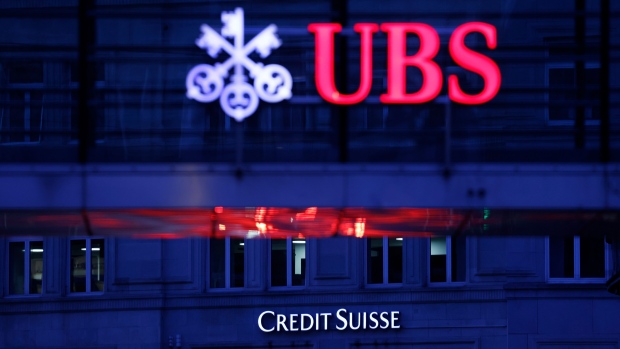Jan 16, 2024
UBS Win as Credit Suisse Money-Laundering Probe Axed
, Bloomberg News

(Bloomberg) -- UBS Group AG got a boost in one of the litany of legal disputes it inherited from Credit Suisse, as authorities dropped a money-laundering probe into the defunct firm’s handling of a rogue banker who fleeced his rich clients.
A year and a half after seeing grounds for indicting Credit Suisse, Geneva’s top financial prosecutor Yves Bertossa told the parties that his investigation failed to find evidence of “any money laundering acts” by Patrice Lescaudron or third parties within the firm, according to the Jan. 9 letter seen by Bloomberg.
It’s the best outcome possible for UBS, which was saddled with numerous legal headaches along with billions of Swiss francs in client assets when it bought its beleaguered rival last year. The mishandling of Lescaudron, who was convicted of fraud and forgery in 2018, led to a trail of court losses from Bermuda to Singapore which has left the combined bank facing hundreds of millions of Swiss francs in damages.
Lescaudron faked signatures and even client account statements to illegally transfer millions from the accounts of his biggest client, Georgian billionaire Bidzina Ivanishvili, to try and make up for growing losses in other clients’ portfolios. Lescaudron’s subterfuge went undetected for nearly a decade before he confessed in 2015. He later took his own life.
Before his U-turn, which he already flagged in a letter last June, Bertossa had highlighted eight transactions Credit Suisse failed to prevent between 2008 and 2014, which he said constituted aggravated money-laundering.
A spokesman for Ivanishvili said the tycoon, a former prime minister of Georgia, is appealing the decision to close the case. Bertossa now “maintains that these crimes should be considered solely within the context of the offenses” for which Lescaudron was convicted, “rather than through the lens of money laundering,” the spokesman said in a statement. “We strongly disagree with this reasoning which ignores the evidence showing the relationship manager’s willingness to hide and launder the proceed of his fraud.”
A spokesman for the prosecutor’s office confirmed the decision had been taken. UBS declined to comment.
Credit Suisse had always maintained that Lescaudron was a lone wolf who hid his deception from colleagues. But a Bermuda court judge who ruled against the bank said it turned a blind eye to his wrongdoing.
Ultimately, it was Credit Suisse’s cavalier approach to risk management that so undermined investor confidence, culminating in its government-brokered rescue last March.
©2024 Bloomberg L.P.


